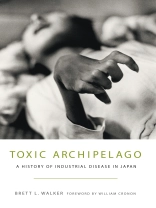Every person on the planet is entangled in a web of ecological relationships that link farms and factories with human consumers. Our lives depend on these relationships — and are imperiled by them as well. Nowhere is this truer than on the Japanese archipelago.
During the nineteenth century, Japan saw the rise of Homo sapiens industrialis, a new breed of human transformed by an engineered, industrialized, and poisonous environment. Toxins moved freely from mines, factory sites, and rice paddies into human bodies.
Toxic Archipelago explores how toxic pollution works its way into porous human bodies and brings unimaginable pain to some of them. Brett Walker examines startling case studies of industrial toxins that know no boundaries: deaths from insecticide contaminations; poisonings from copper, zinc, and lead mining; congenital deformities from methylmercury factory effluents; and lung diseases from sulfur dioxide and asbestos.
This powerful, probing book demonstrates how the Japanese archipelago has become industrialized over the last two hundred years — and how people and the environment have suffered as a consequence.
Tabela de Conteúdo
Preface
Acknowledgments
Introduction: Knowing Nature
1. The Agency of Insects
2. The Agency of Chemicals
3. Copper Mining and Ecological Collapse
4. Engineering Pain in the Jinzu River Basin
6. Hell at the Hojo Colliery
Conclusion
Works Cited
Sobre o autor
Brett Walker is the Michael P. Malone Memorial professor of history at Montana State University. He is the author of A Concise History of Japan (Cambridge UP, 2015), as well as two titles in the Weyerhaeuser Environmental Books series, Toxic Archipelago (2010), which won the George Perkins Marsh Prize for Best Book in Environmental History from ASEH, and The Lost Wolves of Japan (2005). He received a Guggenheim Fellowship in 2013.












